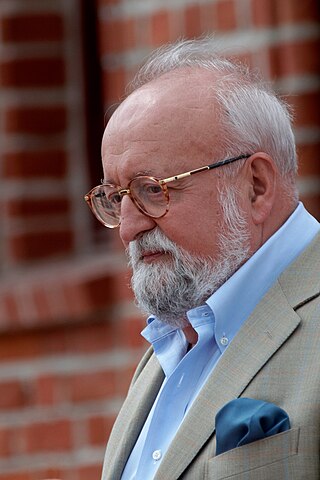Related Research Articles

Ernst Klee was a German journalist and author. As a writer on Germany's history, he was best known for his exposure and documentation of medical crimes in Nazi Germany, much of which was concerned with the Action T4 or involuntary euthanasia program. He is the author of "The Good Old Days": The Holocaust Through the Eyes of the Perpetrators and Bystanders first published in the English translation in 1991.

The Symphony No. 8 "Lieder der Vergänglichkeit" by Krzysztof Penderecki is a choral symphony in twelve relatively short movements set to 19th and early 20th-century German poems. The work was completed and premiered in 2005. The symphony has an approximate duration of 35 minutes. Penderecki revised the symphony in 2007 by adding a few more poem settings and the piece has expanded to around 50 minutes. Although given the designation Symphony No. 8, it was not actually the final symphony Penderecki completed before his death in March 2020; the Sixth Symphony, begun in 2008, was not completed until 2017.

Barbara Rütting, also known as Barbara Ruetting was a German film actress, politician, author and vegetarianism activist. She appeared in 50 films between 1952 and 1979.

Doris Gercke is a German writer of crime thrillers. She also works under the nom de plume Mary-Jo Morell.
How to Explain Pictures to a Dead Hare is a performance piece staged by the German artist Joseph Beuys on 26 November 1965 at the Galerie Schmela in Düsseldorf. While it was only Beuys’s first solo exhibition in a private gallery, it is sometimes referred to as his best known action.
Michael Nehls is a German doctor of medicine, author, and former cyclist. From 1983 until 1989 he studied medicine at the universities of Freiburg and Heidelberg. In 1997, he achieved his postdoctoral lecture qualification in molecular genetics. Nehls authored over 50 scientific publications, two of which were published with the Nobel Prize winners Paul Greengard and Martin Evans. In 2015, his work was honored by the American American Association of Immunologists as a "pillar of immunologic research" for leading investigators in the discovery of a key molecular switch required for the development of the adaptive immune system.

Liederjan is a north-German folk group. It originated as Tramps & Hawkers, which played Irish traditional music in the early 1970s. They gradually started playing German folk music, and in 1975 formed the group Liederjan.
Skot is an old and deprecated measurement unit of luminance, used for self-luminous objects. The term comes from Greek skotos, meaning "darkness".

The Tonhalle is a concert hall in Zurich, home to the Tonhalle-Orchester Zürich, one of Switzerland's leading orchestras. The 1455-seat hall, located at Claridenstrasse 7 in Zurich, was inaugurated in 1895 by Johannes Brahms. The hall is considered to be "acoustically superb". Since 1939, it is part of the building complex Kongresshaus Zürich.
Ernst Immanuel Bekker was a German jurist and professor.

Bert Ehgartner is an Austrian author, journalist, screenwriter, executive producer and director.

"Geh aus, mein Herz, und suche Freud" is a summer hymn with a text in German by theologian Paul Gerhardt written in 1653. It was first published that same year in the fifth edition of Johann Crüger's hymnal Praxis pietatis melica. It was sung to several melodies, the most popular one composed by August Harder, and later became a Volkslied in an abridged version.

Helmut Müller-Enbergs is a German political scientist who has written extensively on the Stasi and related aspects of the German Democratic Republic's history.
"Straf mich nicht in deinem Zorn" is a Lutheran hymn with a text written by Johann Georg Albinus as a paraphrase of Psalm 6. It was first printed with a formerly secular melody in Dresden in 1694. The song was included in 31 hymnals. The melody inspired musical settings both for organ and vocal works. The hymn was translated by Catherine Winkworth as "Not in anger, Mighty God", which appeared in 13 hymnals.

Prasterone enanthate, also known as dehydroepiandrosterone enanthate (DHEA-E) and sold in combination with estradiol valerate under the brand name Gynodian Depot among others, is a weak androgen, estrogen, and neurosteroid medication which is used as a component of menopausal hormone therapy to treat menopausal symptoms in women. It is available only as an injectable preparation in combination with estradiol valerate. The medication is given by injection into muscle typically once every 4 weeks.

Natalie Grams-Nobmann is a German physician and author. Formerly a practicing homeopath, she became known throughout Germany as a whistleblower for her 2015 debut book Homeopathy Reconsidered – What Really Helps Patients in which she criticized homeopathy. In 2016 she joined the Science Council of the Society for the Scientific Investigation of Parasciences. From January 2017 to April 2020 she served as Communications Manager for the GWUP. She also serves on the advisory board of the humanist Giordano Bruno Foundation since May 2017, and as vice president of the Humanist Press Foundation in Germany since October 2017. In October 2017 her second book, Gesundheit – A Book Not Without Side Effects, was published. It was followed by her third book, What really Works – Compass through the World of Gentle Medicine, in February 2020. In 2021, Natalie Grams was awarded the Fellowship of the Committee for Skeptical Inquiry. This award is given for "distingued contributions to science and skepticism and for commitment to rational inquiry and public education".

Estradiol butyrylacetate/testosterone ketolaurate/reserpine (EBA/TKL/R), sold under the brand name Klimanosid R-Depot, is an injectable combination medication of estradiol butyrylacetate (EBA), an estrogen, testosterone ketolaurate, an androgen/anabolic steroid, and reserpine, an antipsychotic, which was previously used in menopausal hormone therapy for women, particularly in those with pronounced neurovegetative symptoms. It contains 2 mg EBA, 50 mg TKL, and 0.4 mg reserpine in oil solution in each 1 mL ampoule and is administered by intramuscular injection at regular intervals. The medication was marketed in 1957.
Rolf von Sydow was a German film director and author.

Martin Wehrle is a German journalist, career advisor and non-fiction author. He is also known as an advocate of universal basic income (UBI).

Gertrud Höhler is a German literary scholar, management consultant and political consultant.
References
- ↑ "Ein Rostocker erklärt die Haut". Norddeutsche Neueste Nachrichten. 11 May 2022.
- ↑ "Robin Haring". Monash University.
- ↑ Roedig, Andrea (19 July 2016). "Manneskraft, die alles schafft" (in Swiss High German). Neue Zürcher Zeitung.
- ↑ "Testosteron ist keine Ausrede". Die Presse (in German). 6 June 2015.
- ↑ Hollersen, Wiebke (4 October 2015). "Der Mythos vom bösen Testosteron". Die Welt.
- ↑ "Genetic markers for testosterone, estrogen level regulation identified". ScienceDaily.